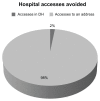Active home-based cancer treatment
- PMID: 22807631
- PMCID: PMC3396069
- DOI: 10.2147/JMDH.S31494
Active home-based cancer treatment
Abstract
Background: Active home-based treatment represents a new model of health care. Chronic treatment requires continuous access to facilities that provide cancer care, with considerable effort, particularly economic, on the part of patients and caregivers. Oral chemotherapy could be limited as a consequence of poor compliance and adherence, especially by elderly patients.
Methods: We selected 30 cancer patients referred to our department and treated with oral therapy (capecitabine, vinorelbine, imatinib, sunitinib, sorafenib, temozolomide, ibandronate). This pilot study of oral therapy in the patient's home was undertaken by a doctor and two nurses with experience in clinical oncology. The instruments used were clinical diaries recording home visits, hospital visits, need for caregiver support, and a questionnaire specially developed by the European Organization for Research and Treatment of Cancer (EORTC), known as the QLQ-C30 version 2.0, concerning the acceptability of oral treatment from the patient's perspective.
Results: This program decreased the need to access cancer facilities by 98.1%, promoted better quality of life for patients, as reflected in increased EORTC QLQ-C30 scores over time, allowing for greater adherence to oral treatment as a result of control of drug administration outside the hospital. This model has allowed treatment of patients with difficult access to care (elderly, disabled or otherwise needed caregivers) that in the project represent the majority (78% of these).
Conclusions: This model of active home care improves quality of life and adherence with oral therapy, reduces the need to visit the hospital, and consequently decreases the number of lost hours of work on the part of carers. Management of the service by the professionals involved revealed excellent control of the process by nursing staff, with minimal visits involving doctors.
Keywords: cancer; compliance; home-based; quality of life; treatment.
Figures
References
-
- Palmieri FM, Barton DL. Challenges of oral medications in patients with advanced breast cancer. Semin Oncol Nurs. 2007;23(4 Suppl 2):17–22. - PubMed
-
- Liu G, Franssen E, Fitch MI, et al. Patient preferences for oral versus intravenous palliative chemotherapy. J Clin Oncol. 1997;15:110–115. - PubMed
-
- Demetri GD, von Mehren M, Blanke CD, et al. Efficacy and safety of imatinib mesylate in advanced gastrointestinal stromal tumors. N Engl J Med. 2002;347:472–480. - PubMed
-
- Welt A, von Minckwitz G, Oberhoff C, et al. Phase I/II study of capecitabine and vinorelbine in pretreated patients with metastatic breast cancer. Ann Oncol. 2005;16:64–69. - PubMed
LinkOut - more resources
Full Text Sources



